A West Virginia Catholic Worker at Standing Rock: Q&A with Nic Cochran
BY MICHAEL IAFRATE | December 14, 2016
Until recently, Nic Cochran lived at House of Hagar Catholic Worker in Wheeling, West Virginia where he worked with people experiencing homelessness and with Grow Ohio Valley, a Wheeling non-profit that focuses on urban farming and food justice. Originally from Marietta, Ohio, Nic is a graduate of Wheeling Jesuit University. This past fall, Nic spent two weeks at Standing Rock with Dakota Access Pipeline protestors, and last week I spoke with him the day before he departed again for Standing Rock to continue to take a stand in the struggle. Here is an edited version of our conversation.
When did you first make the trip to Standing Rock and why did you go?
I had thought about going there since this summer, when private security forces attacked unarmed water protectors with attack dogs and rubber bullets. That’s when it really got on my radar, but reality set in, and I thought, no, I’ve got obligations with the Catholic Worker house, so I can’t really take that time away. Then in October I was doing some reading about the pipeline, around the time Amy Goodman was acquitted from the charges she faced [related to Standing Rock]. I read a lot of her work and did some research.
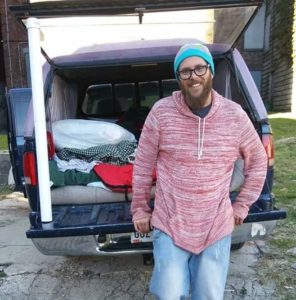
Nic Cochran, preparing to depart for Standing Rock.
I went by myself, but ended up not being by myself at all. There was a strong sense of community, people helping each other, a real sense of love and unity at camp, and I was very grateful to be drawn into that. The trip ended up becoming equal parts social action and retreat. I was able to connect with my own spirituality and have some great conversations with people from other backgrounds. I met a 77-year-old Ojibwe pipe carrier who taught me so much about indigenous spirituality, and was able to give me a perspective from a people that has been historically, systematically, and violently oppressed. I had some conversations about the face of racism in the 21st century, and structures that maintain oppression, with structures in place that keep people oppressed. I left there deciding that, if I go back, I will be going as a white ally, because this specific struggle on this reservation is not mine. I am here to be a support to the people who are directly impacted. If I want [to engage in a struggle that is] my struggle, I can do it here in West Virginia because God knows we have plenty of it.
Why are you now going back to Standing Rock?
I decided to go back when the Army Corps of Engineers and the Governor of North Dakota announced the eviction of the protestors north of the Cannonball River. I was with my father recently and [saw an article on my phone] and I was so mad. Like, look at what has happened over the last 500 or 600 years. This is what we’ve done and we’re just going to do it again. And I was so angry. My dad said, “You’re going back to Standing Rock, aren’t you?” And I said, “Yeah, I am.” I’m going back because that’s the call that was put out by the elders of the different camps. They said, “We need people here now more than ever. If you can’t be here, you can help us with supplies. If you can’t help us with supplies, you can pray.” The camp identifies itself as a prayer camp, and all of the direct action is rooted in prayer. Every march begins with prayer. Prayers are said during and prayers are said afterwards. There certainly can be agitation and escalation from the water protectors, but I never saw any violence from them, and the emphasis is on prayer. But I’m going back as a response to a call from the elders and maybe a call from God. My intention is to be an ally, to go and to listen to what the indigenous people are asking for and then to fulfill those requests.
Can you say more about what your presence as a white, Catholic ally means to you, especially in light of the silence of Catholic leaders on these events and the Roman Catholic Church’s reluctance to explicitly repudiate the Doctrine of Discovery?
Being there as a Catholic is important to me. The more Catholics that are there I think is important as well, [in order] to say we know that we have been a part of that oppression. The only thing that I can do, personally, is to be there and listen and hear people’s grievances, and then to be a loving presence, to help those wounds to begin healing. I’m not saying this is only my responsibility, but everyone’s responsibility, and not just with indigenous peoples but with our sisters and brothers who are Muslim, our sisters and brothers of color, people living in poverty. We have an obligation to be a loving presence for everyone.
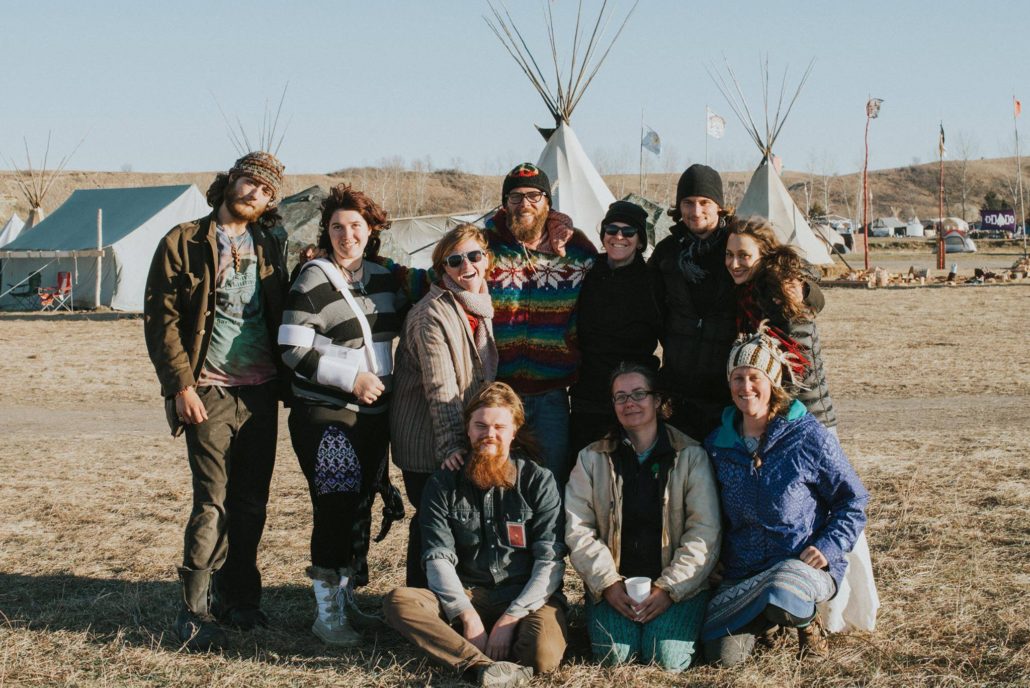
Nic (center back) with others at Standing Rock.
And where is our church? The hierarchy remains silent. And in light of Pope Francis and Laudato Si’, how can Catholic leadership remain silent? I’ve seen a couple of Catholic figures there. On the day clergy from all over the United States had been called to come, they were hoping for 200 clergy might show up. I woke up and went to the sacred fire and 520 clergy members from different Christian denominations and different religions were there. There were four or five imams, several Zen masters, several rabbis… Hare Krishnas were there. And I ran into one Catholic priest [who was from] from Rhode Island. They had a very ceremonial burning of the Doctrine of Discovery, saying we as various churches reject this doctrine that says to convert the nonbelievers.
What is one story you can tell from your time at Standing Rock that has impacted you?
There were instances of racial anger. [One night, shortly after some arrests were made,] two older Native men were very, very upset, and they were crying. They were saying, “Can you blame us for doing this? Can you blame us for being angry? You’re lucky that we haven’t gotten angrier. Do you have any idea what it’s like to be pushed off of your land? Do you have any idea what it’s like to have your people killed?” I was about to defend myself or say, “That wasn’t me. I didn’t do that.” I had just a split second of clarity, and instead I said, “No, I don’t know what that’s like. But I want to be able to help today, so let us know what we can do to help.” And they said, “Thank you for coming, and thank you for coming with a good attitude.” Which was an attitude I hadn’t developed until that very second when I was able to witness a stranger’s vulnerability and pain, and I was given the grace to be able to respond in a way that might open to the door for healing. That was one of the most impactful moments for me.
Hearing about your witness of solidarity is powerful, but of course people need to hear indigenous voices directly. What are some resources for hearing those voices?
The Indigenous Environmental Network is a great resource, as is the International Indigenous Youth Council, which is one of the organizations that started the whole thing. Another great way to stay in touch is to follow Oceti Sakowin Camp and Sacred Stone Camp on Facebook. Or, follow me on Facebook. I will be posting updates as often as I can. Al Jazeera, The Guardian, and BBC are all doing some fantastic reporting. If you’re looking for American sources, Democracy Now! is a good one.
How can folks back home, and elsewhere, offer support?
There’s a long list of people we can call, starting with Colonel [John] Henderson, the person in charge of the Army Corps of Engineers for the Omaha region. We are asking for a full environmental impact assessment which would delay the DAPL beyond deadlines that its funders have set. [As of this writing, the Army Corps of Engineers has denied the final permit for the construction of this section of the pipeline and so construction is at least temporarily halted. Protestors are awaiting further information, sensing that the struggle is not over.—Ed.] Another way you can help is by getting your money out of PNC Bank and Chase bank. Find out who your bank supports financially. If you don’t like what they’re doing, vote with your dollars, divest and put it in a credit union. By way of material support, money can be donated to the camps through their websites—Oceti Sakowin Camp, Sacred Stone Camp, Red Warrior Camp. There are checklists and Amazon wishlists for the camps. When I left Standing Rock, there was a need for winterization supplies. [As of this writing, the camps are no longer taking donations of supplies through Amazon wishlists due to the overwhelming support. Please check the camps’ websites for current information.—Ed.] If you can’t come or provide material support, pray. Everyone can pray. One of the things the elders say is that this battle has already been won in the spiritual world, and we’re just trying to enact it in the physical world.
You graduated from and have worked at Jesuit institutions. What role has Jesuit education played in the choices you’re making to act in solidarity with Standing Rock?
I transferred to a Jesuit university and I missed all of the orientation to the [major concepts of] Jesuit education and Ignatian spirituality. But I think I found them anyway through engaging in service. I did a service trip to New Orleans, and one night we did a ground zero tour to see the impacts of hurricane Katrina with a man who had lived in New Orleans for 26 years. It was an emotional experience to see how the water had risen so high and to hear about the people who had lost their lives. After we toured the Lower Ninth Ward where the water reached twenty feet or more, we went to Lakeview where we were staying. It is a really nice, white neighborhood, and there the flood reached about 8 feet high. Our guide said, “We recovered a little bit better here than they did down in the Lower Ninth Ward, because we were smart and bought flood insurance.” I got so angry, and thought, “Do you not realize that the people in the Lower Ninth Ward are living in poverty and maybe can’t afford flood insurance? It has nothing to do with you being smarter.” I was hearing a lot of comments like that.
The guide also told us about a doctor at the local hospital that was overwhelmed. The doctor told a National Guardsman not to bring any “looters” in. The Guardsman said, “Oh, don’t worry, we won’t. A local warehouse is filled with body bags with looters, because we don’t tolerate that behavior here.”
I had these experiences of deep social injustice being rationalized by people, and my spirit felt so perturbed. But it was that uncomfortable place where you realize that, as a person of faith, you have a responsibility to act, but to do so from a place where you’re honoring the people that you are working with. Not just working for others, but with them, because that person has the light of God in them, and they need to be honored. A Jesuit education helped me to articulate this better, and allowed the possibility to be in spaces where challenging things could occur. I mean, the guy we talked to who said those things is not a bad guy. He is working to bring in groups to help rebuild the city. He was expressing ideas that are oppressive, but despite that discomfort, we could be there doing good with this person who is doing good work too.
Oppressive ideas that are hard to identify in ourselves, let alone get rid of.
Yeah. And we all have those. I have them. You have them. And I guess the idea is, through introspection and the Examen, to look into ourselves and ask, “Where have I—to take the literal meaning of the word sin—where have I missed the mark? Where did I fall short of loving God through people today?” That’s what I got out of a Jesuit education, that sense of responsibility. When I start to look at my skill set and my talents, I think, “Oh, I don’t really have a whole lot to offer.” But I have me to offer. And there’s some dignity in that. And at the end of the day, that’s all we have: ourselves, our bodies, our thoughts, our love.
Michael Iafrate is Co-Coordinator of the Catholic Committee of Appalachia (CCA) and served as the lead author of CCA’s “People’s Pastoral,” The Telling Takes Us Home: Taking Our Place in the Stories that Shape Us. He is a West Virginia native, a graduate of Wheeling Jesuit University (’99 and ’03), and is completing a dissertation in theology for the University of St. Michael’s College at the University of Toronto. His writing has appeared in National Catholic Reporter and Religion Dispatches and in the collections Secular Music and Sacred Theology, edited by Tom Beaudoin (Liturgical Press, 2013) and the forthcoming Music, Theology, and Justice, edited by Michael O’Connor, Christina Labriola, and Hyun-Ah Kim (Lexington Books, 2017). He is also a singer-songwriter and old time musician.

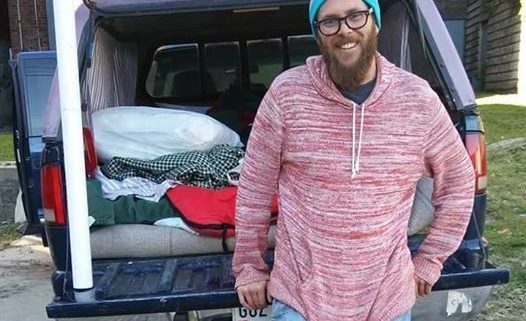

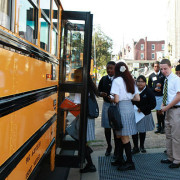

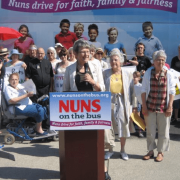
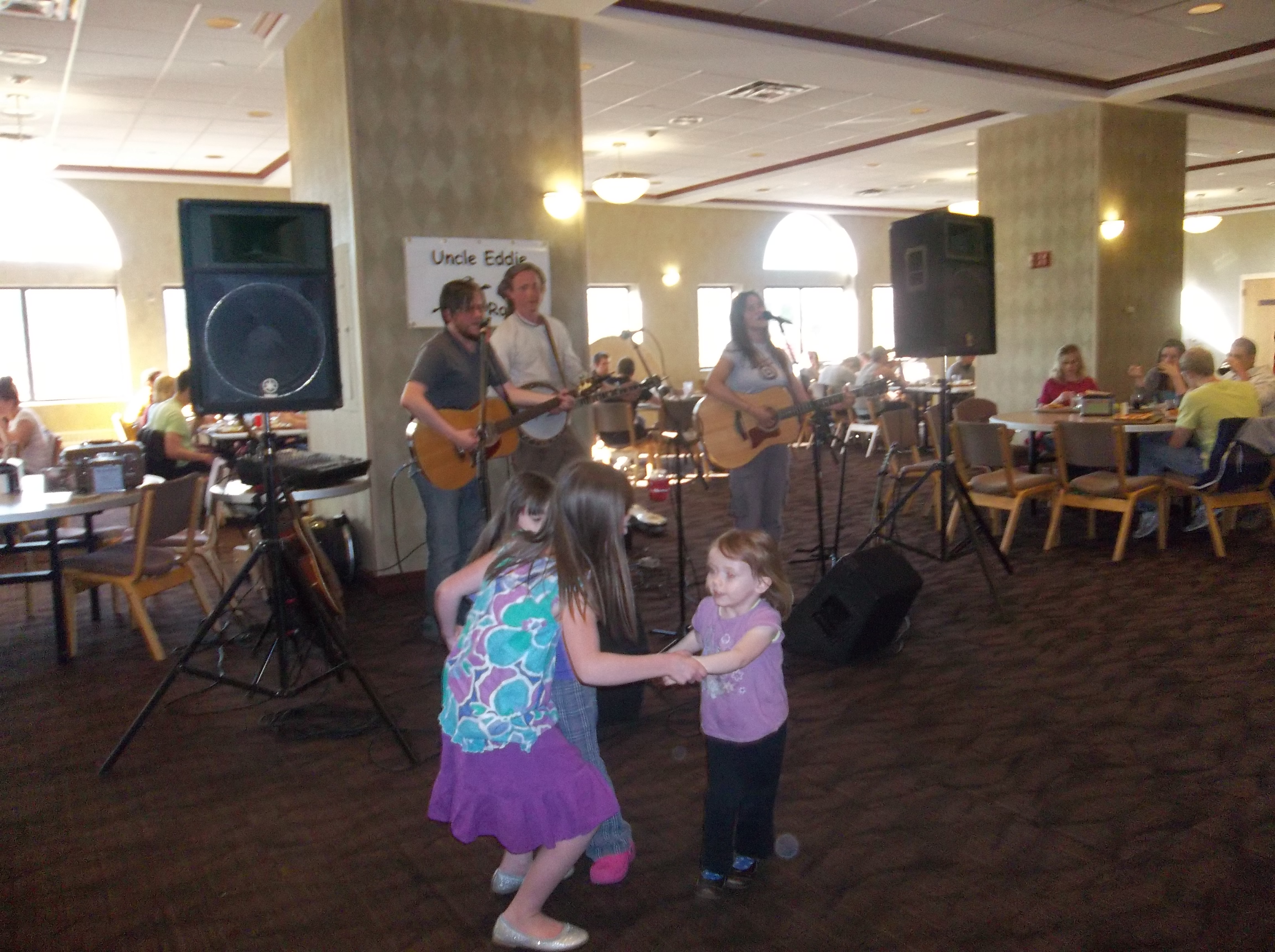



Leave a Reply
Want to join the discussion?Feel free to contribute!